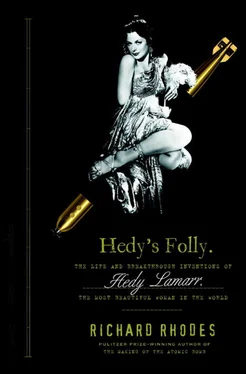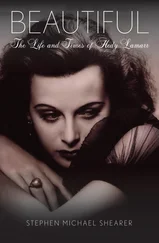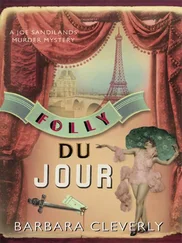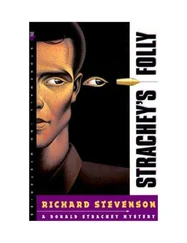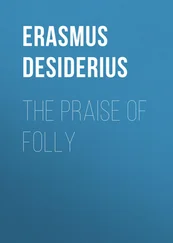[ONE]
A Charming Austrian Girl
She was Viennese, not yet seventeen in the spring of 1931 but already a professional actress, in rehearsal for a play. Hedwig Kiesler (pronounced HAYD-vig KEES-lur )—Hedy—had won a small role in the Berlin incarnation of The Weaker Sex , which the celebrated Austrian impresario Max Reinhardt was directing. When Reinhardt restaged the play in Vienna that spring, she had single-mindedly quit the Berlin cast and followed him home. “Are you here too, Fraulein Kiesler?” he’d asked her in surprise. “Are you living with your family? All right, you can be the Americaness again.” Édouard Bourdet’s play was a comedy with a pair of boorish stage Americans as foils. Reinhardt had assigned the actor George Weller, Hedy’s husband in the play, to teach her some American songs. “I took this as a mandate to make an American out of Hedy Kiesler,” the young Bostonian recalled.
She was eager to be transformed. “Hedy had only the vaguest ideas of what the United States were,” Weller discovered, “except that they were grouped around Hollywood.” She idolized the California tennis star Helen Wills, “Little Miss Poker Face.” Wills, focused and unexpressive on the courts, all business, was the world’s number-one-ranked female tennis player, midway that year through an unbroken run of 180 victories. “Watch me look like Helen Wills,” Hedy teased Weller when they rehearsed together. “ Du, schau’ mal, hier bin ich Kleine Poker Face. ” Her lively young face would grow calm, Weller remembered, “expressionless and assured, her brow would clarify, and for a moment she would really become an American woman.” Commandeering the property room, Hedy and George practiced singing “Yes, Sir, That’s My Baby,” “Yes, We Have No Bananas,” and an Austrian favorite, Al Jolson’s lugubrious “Sonny Boy.” It melted the matrons at matinees, many of them mothers with sons lost in the long slaughter of the Great War.
An only child, entertaining herself with her dolls, Hedy had dreamed since she was a little girl of becoming a movie star. “I had a little stage under my father’s desk,” she recalled, “where I would act out fairy tales. When someone would come into the room they would think my mind was really wandering. I was always talking to myself.” Her tall, handsome, vigorous father, Emil, an athlete as well as a successful banker, told her stories, read her books, and took her on walks in their tree-lined neighborhood and in the great park of the Wienerwald—the Vienna Woods. Wherever they went together, he explained to her how everything worked—“from printing presses to streetcars,” she said. Her father’s enthusiasm for technology links her lifelong interest in invention with cherished memories of her favorite parent.
Hedy’s mother was stricter, concerned that such a pretty, vivacious child would grow up spoiled unless she heard criticism as well as compliments. “She has always had everything,” Trude Kiesler said. “She never had to long for anything. First there was her father who, of course, adored her, and was very proud of her. He gave her all the comforts, pretty clothes, a fine home, parties, schools, sports. He looked always for the sports for her, and music.” Trude had trained as a concert pianist before motherhood intervened. In turn, she supervised Hedy’s lessons on the grand piano in the Kiesler salon. “I underemphasized praise and flattery,” Trude determined, “hoping in this way to balance the scales for her.”
The Kieslers were assimilated Jews, Trude from Budapest, Emil from Lemberg (now known as Lviv). Hedy kept her Jewish heritage secret throughout her life; her son and daughter only learned of it after her death. In prewar Vienna it had hardly mattered. The Viennese population’s mixed legacy of Slavic, Germanic, Hungarian, Italian, and Jewish traditions was one of its glories, one reason for the city’s unique creative ferment in the first decades of the new century. Sigmund Freud’s daughters attended the same girls’ middle school that Hedy later did, and after the war Anna Freud taught there.
Vienna is an old city, with ruins dating to Roman times. The emperor Marcus Aurelius wrote his third book of Meditations on that rough Germanic frontier. Set in the broad Danube valley at the eastern terminus of the Alps, it grew across the centuries through great turmoil to become the capital of the Austro-Hungarian Empire. A wide ring boulevard supplanted its medieval wall after 1857, opening it up to its suburbs. By 1910, two million ethnically diverse Viennese, reading newspapers published in ten languages, took their leisure in sparkling coffeehouses, and the beneficence of the emperor Franz Josef had filled the city’s twenty-one districts with parks, statues, and palaces. To the Viennese writer Stefan Zweig, his birthplace was “a city of a thousand attractions, a city with theatres, museums, bookstores, universities, music, a city in which each day brought new surprises.”
If Vienna was old, it made itself radically modern in the years around the Great War in music, theater, and art. Austrian culture had prepared the way, Zweig believed: “Precisely because the monarchy, because Austria itself for centuries had been neither politically ambitious nor particularly successful in military actions, the native pride had turned more strongly toward a desire for artistic supremacy.” Vienna was the arena of that desire. The roll call of important early-twentieth-century artists, musicians, writers, scientists, and philosophers active in the Viennese milieu is startling: the artists Gustav Klimt, Josef Hoffmann, Egon Schiele, and Oskar Kokoschka; the writers Hugo von Hofmannsthal, Arthur Schnitzler, Robert Musil, and Joseph Roth; the composers Gustav Mahler, Arnold Schoenberg, Anton von Webern, and Alban Berg. Sigmund Freud invented psychoanalysis in Vienna. Ludwig Boltzmann and Ernst Mach contributed importantly to physics there. Rudolf Carnap, Kurt Gödel, Otto Neurath, and, most famously, Ludwig Wittgenstein transformed philosophy.
“The whole city was at one,” Zweig saw, in its “receptivity for all that was colorful, festive and resounding, in [its] pleasure in the theatrical, whether it was on the stage or in reality, both as theatre and as a mirror of life.” For Zweig, theater was the core Viennese experience:
It was not the military, nor the political, nor the commercial, that was predominant in the life of the individual and of the masses. The first glance of the average Viennese into his morning paper was not at the events in parliament, or world affairs, but at the repertoire of the theatre, which assumed so important a role in public life as hardly was possible in any other city. For the Imperial theatre, the Burgtheater, was for the Viennese and for the Austrian more than a stage upon which actors enacted parts; it was the microcosm that mirrored the macrocosm, the brightly colored reflection in which the city saw itself…. The stage, instead of being merely a place of entertainment, was a spoken and plastic guide of good behavior and correct pronunciation, and a nimbus of respect encircled like a halo everything that had even the faintest connection with the Imperial theatre.
What else but theater, and by extension motion pictures, would a bright, pretty, single-minded Viennese girl choose? “I acted all the time,” Hedy recalled. “I copied my mother. I copied the way she walked and the way she talked. I copied her mannerisms, her facial expression. I copied the guests who came to our house. I copied people I saw in the streets. I copied the servants. I was a little living copybook. I wrote people down on me.”
Acting was in the air. In his school classes, Zweig remembered, “in keeping with the Viennese atmosphere… the impulse to creative production became positively epidemic. Each of us sought some talent within himself and endeavored to unfold it.” Four or five of Zweig’s classmates wanted to be actors. “They imitated the diction of the Imperial players, they recited and declaimed without ceasing, secretly took lessons in acting, and, during the recesses at school, distributed parts and improvised entire scenes from the classics, while the rest of us formed a curious but exacting audience.”
Читать дальше
